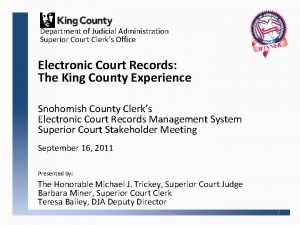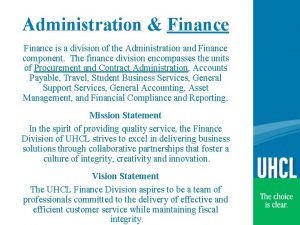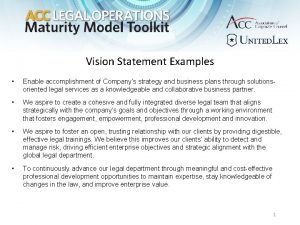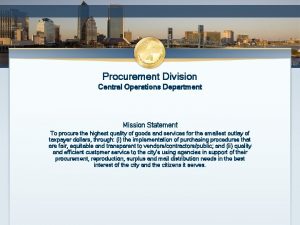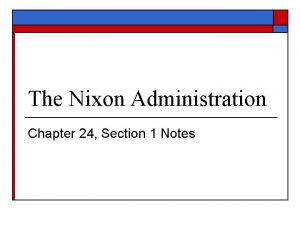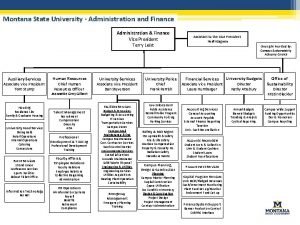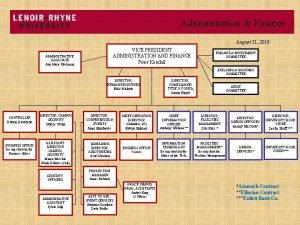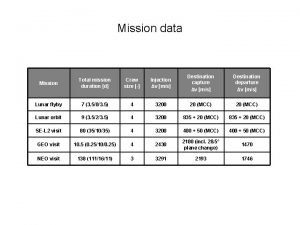Welcome to the Department of Finance Administration Mission













































































- Slides: 77

Welcome to the Department of Finance & Administration!

Mission DFA’s Mission The Department of Finance & Administration, as the executive branch agency for fiscal and asset management, provides services, solutions, regulations, and guidance to its customers to help improve the quality of life in Mississippi.

Vision DFA’s Vision The Department of Finance & Administration sets the standard for excellence in the State Government Enterprise. We will facilitate change for better government.

Public Service The employees of the Department of Finance and Administration are responsible for providing a long list of essential services and critical functions for state government. We are a public service agency, so when you accepted employment with the Department of Finance & Administration, you accepted a job in public service. Every job is important because we want to make sure government works for the citizens of our State!

Public Service What DFA Does! • Provide information to decision makers; • Pay the state’s bills; • Balance the state’s check book; • Fly the governor and elected officials to promote the State; • Negotiate contracts; • Manage public employee health and life insurance; • Manage the sale of bonds; • Safeguard taxpayer money; • Build state buildings, university classrooms, and prisons; • Keep the air conditioning running; • Fix the plumbing; • Turn on the lights; • Mop the floors; • Take out the trash; • Cut the grass; • Protect and secure the Capitol Complex, employees, and visitors; and • So many other things you could never list them all!

Public Service • DFA is a public service agency. • DFA employees provide services to the public and other agencies. • DFA employees should be good stewards of Mississippi’s financial resources. • DFA employees should embody public sector competencies that have been adopted by the Mississippi State Personnel Board.

Public Service Public Sector Competencies: • Integrity & Honesty • Work Ethic • Service Orientation • Accountability • Self-Management Skills • Interpersonal Skills • Communication Skills • Self-Development

DFA Facts: • DFA consists of 23 diverse offices; • DFA has 505 positions and over 435 employees plus contract workers; • DFA responsibilities are set in statute; • Responsibilities and duties were performed by: – – – Budget Commission Building Commission Capitol Commission Surplus Property Commission State Auditor’s Office

DFA Facts • The Government Reorganization Act of 1984 created an Executive Office under the Governor and streamlined government. • Fiscal Management Board and Governor’s Office of General Services were created by this Act; • Fiscal Management Board was responsible for negotiating state purchasing contracts, state insurance programs, fiscal management, and crafting the Executive budget request. • The Governor’s Office of General Services was responsible for state building construction, grounds, surplus property, and managing capitol facilities.

DFA Facts • The Executive Branch was reorganized again by the Mississippi Executive Reorganization Act of 1989. • The Fiscal Management Board, the Governor’s Office of General Services, and the state aircraft operations from the Military Department were combined and the Department of Finance & Administration was created on January 1, 1989. • The DFA Executive Director is appointed by the Governor, and serves as State Fiscal Officer.

Your co-workers include: • Accountants, including CPA’s; • Administrative Assistants; • Administrators; • Architects; • Carpenters; • Custodians; • Groundskeepers; • Electricians; • Engineers; • Information Technology Professionals; • Insurance Specialists; • Jet Pilots; • Law Enforcement Officers; • Maintenance Professionals; • Many other professions!

DFA Responsibilities: • Maintain the State’s general ledger, issue state warrants, issue the State’s payroll, and prepare the State’s consolidated financial report; • Manage critical state assets and infra-structure such as the State’s accounting system, human resources and payroll system, resource library systems, systems which support e-government functions and transactions, including the development of Mississippi’s Accountability System for Government Information and Collaboration – the State’s next generation of technology, known as MAGIC;

DFA Responsibilities • Maintain and manage 30 state-owned buildings located in the Jackson Capitol Complex, Hattiesburg, and Biloxi; • Ensure law enforcement in the Capitol Complex through the Capitol Police; • Operate the State’s fleet of one jet aircraft; • Manage the State and School Employee’s Life and Health Plan; • Manage the Bond Advisory function;

DFA Responsibilities • Manage the State’s fleet of automobiles; • Manage the Tort Claim’s fund; • Negotiate state procurement and purchasing contracts and travel contracts; • Receive and distribute federal and state surplus property.

DFA Responsibilities Funds DFA Manages: • $990 million to $1. 2 billion in bonds allocated for state projects; • $700 million annually for the state health and life insurance plan; • $5 million in unemployment compensation fund; • $28 million in the workers’ compensation trust fund; • $10 million in property insurance on $4 billion in property; • $20 million in tort claims funds.

DFA Leadership Leaders of DFA Management Team: Liz Welch Executive Director • Glenn Kornbrek Deputy Executive Director Facility Construction & Management • Becky Thompson Deputy Executive Director Statewide Management Information Services • Reginald Welch Deputy Executive Director Financial Affairs • Aubrey Leigh Goodwin Deputy Executive Director Procurement & Contract Review

Offices Reporting to Liz Welch Executive Director: • Office of Air Transport Services Brandon Fons, Director • Office of Human Resources Kesha Funches, Director • Office of Capitol Police Don Byington, Director • Office of Insurance Richard Self, Director • Office of Tort Claims Lea Ann Mc. Elroy, Director • Property & Commodity Services David Clanton, Director

Liz Welch Executive Director Office of Air Transport Services Brandon Fons, Director The Office of Air Transport Services has a primary responsibility to adopt and implement operational policies and procedures that are conducive to the safe and efficient operation of the aircraft under the purview of the Department of Finance & Administration in order to meet the air transportation needs of elected officials and all entities of State Government.

Liz Welch Executive Director Office of Human Resources Kesha Funches, Director The Office of Human Resources provides support and assistance to employees and managers on human resources, organizational planning, payroll, and benefit issues in an effort to maximize services delivered to other agencies and to the citizens of the State of Mississippi.

Liz Welch Executive Director Office of Capitol Police Don Byington, Director The Office of Capitol Police has law enforcement jurisdiction over the State Capitol Complex and provides security, law enforcement, and protective services for elected officials, state employees, and visitors of the State Capitol Complex.

Liz Welch Executive Director Office of Insurance Richard Self, Director The Office of Insurance administers the State and School Employees’ Life and Health Insurance Plan, the State Agencies Self-Insured Workers’ Compensation Trust, and the Employment Compensation Revolving Fund.

Liz Welch Executive Director Office of Tort Claims Lea Mc. Elroy, Director The Office of Tort Claims reports to the Mississippi Tort Claims Board (Board) and provides administrative and technical support for equitable settlement and payment of claims for injury or damage arising out of the torts of governmental entities and their employees while acting within the course and scope of their employment. The office also provides oversight of liability coverage plans of all political subdivisions, maintains loss control programs, and provides risk management services. The Tort Claims staff purchases and maintains property coverage on state owned building and contents through the Mississippi Department of Finance & Administration (DFA).

Liz Welch Executive Director Office of Internal Audit Philando Brown, Director The Office of Internal Audit provides an independent, objective analysis and consulting services designed to add value and improve DFA’s department operations. It assists the department in accomplishing its objectives by bringing a systematic, disciplined approach to evaluate and improve the effectiveness of risk management, control and governance processes.

Liz Welch Executive Director • The Capitol Complex Improvement District (CCID) Vacant, Director The Capitol Complex Improvement District (CCID) was created by the Mississippi Legislature to establish regular funding and administration of infrastructure projects within a defined area of the city of Jackson. CCID infrastructure projects will be administered by the Department of Finance and Administration (DFA); however, the City of Jackson, who owns the public infrastructure within the District, remains responsible for planning its own improvements and for routine maintenance of all infrastructure within the CCID.

Offices Reporting to Glen Kornbrek Deputy Executive Director: • Office of Building, Grounds & Real Property Management Calvin Sibley, Director • Office of Capitol Facilities Roe Grubbs, Director • Office of State Property Insurance George Roberson, Director • Office of Surplus Property David Clanton, Director

Glen Kornbrek Deputy Executive Director Office of Building, Grounds, & Real Property Management Calvin Sibley, Director The Office of Building, Grounds, and Real Property Management facilitates the planning and construction of public use facilities for the State’s governmental services. Their goal is to provide State Institutions and Agencies with an environment that is conducive to efficient and effective operations.

Glen Kornbrek Deputy Executive Director Office of Capitol Facilities Roe Grubbs, Director The Office of Capitol Facilities acts as the property manager for the Capitol Complex and is responsible for the leasing of space, collection of rent, as well as the maintenance and servicing of all 30 buildings and grounds that are designated as the Capitol Complex. The office has five divisions: administration, maintenance, carpentry, custodial, and grounds.

Glen Kornbrek Deputy Executive Director Office of State Property Insurance George Roberson, Director The Office of State Property Insurance purchases, manages and maintains business property insurance for all State-owned institutions, agencies, and departments. It updates and produces the Statement of Values for all State-owned buildings and contents. It monitors and manages all federal laws and regulations of the Federal Emergency Management Agency (FEMA).

Glenn Kornbrek Deputy Executive Director Office of Surplus Property David Clanton, Director The Office of Surplus Property’s responsibility is to save tax dollars receiving and distributing usable state and federal property to state and local government agencies and qualified local organizations at a low cost. Property is identified via the Internet, microfiche, and contacts throughout the nation and overseas. Staff from this office is also sent throughout the southeastern states in search of property. The Office makes aggressive attempts to acquire any type of useful property such as office furnishings, shop equipment, heavy equipment, and aircraft.

Offices Reporting to Becky Thompson Deputy Executive Director: • • Office of Mississippi Management Reporting Mississippi Accountability System for Government Information, Collaboration (MAGIC), and Legacy Systems Brenda Benson, Director Office of Information Technology Preston Pierce, Director

Becky Thompson Deputy Executive Director Office of Mississippi Management Reporting Systems Mississippi’s Accountability System for Government Information and Collaboration (MAGIC) Brenda Benson, Director The Office of MAGIC is Mississippi’s pursuit of an Enterprise Resource Planning solution to research for consideration the possible replacement of the Statewide Automated Accounting System (SAAS), the Statewide Payroll and Human Resource System (SPAHRS), and the Mississippi Executive Research Library and Information Network (MERLIN).

Becky Thompson Deputy Executive Director Office of Mississippi Management Reporting Systems (MMRS) Legacy Systems Brenda Benson, Director The Office of MMRS is responsible for the development, enhancement, maintenance, and support of several statewide applications that combine to form a central repository of management information. The primary statewide applications maintained by MMRS are: the Statewide Automated Accounting System (SAAS), the Statewide Payroll and Human Resources System (SPAHRS), and the Mississippi Executive Resource Library and Information Network (MERLIN). MMRS also provides support to the related State’s web portal, Web. Procure, Pay. Mode, GENIE, E-Payment, MATA, Protégé, ACE, MELMS, I 2 K, and FMVIEW

Becky Thompson Deputy Executive Director Office of Information Technology Preston Pierce, Director The Office of Information Technology is responsible for the management of data processing for the Department of Finance and Administration, processing warrants for the majority of state agencies, and management of the access badge system utilized in the Capitol Complex. Information Technology is responsible for the preparation of DFA's Information System Plan and Budget and coordinates all requests for hardware and software acquisitions for the agency, with the exception of MMRS and MAGIC. The Office provides technical assistance and training to staff in the operation of DFA's mid-range computers, personal computers, and their applicable software.

Offices Reporting to Reginald Welch Deputy Executive Director: • Office of Bond Advisory Gilda Reyes, Director • Office of Budget & Accounting Jason Quon, Director • Office of Budget & Fund Management Priscilla Ware, Director • Office of Fiscal Management Lisa Dunn, Director • Office of Financial Reporting Shondra Barker, Director • Office of Financial Affairs Marcus Moore, Director

Offices Reporting to Reginald Welch Deputy Executive Director: • Office of Business Services Mary May, Director Office of Business Services Ross Campbell, Director • Office of Personal Contract Service Review Brittney Thompson, Director

Reginald Welch Deputy Executive Director Office of Bond Advisory Gilda Reyes, Director The Office of Bond Advisory has the responsibility to assist in the development of standardized documentation of the State’s bond sales and issuance, delivery of such sales, and maintenance a complete record of all outstanding state bonds including bonds issued, maturity dates, and interest costs. Duties include monitoring regulatory and legislative developments, current economic, financial and growth conditions of the state; conduct studies and investigations of government bond interest costs; record current and accurate information regarding bond market trends and other data; investigate and require reports covering proposed transactions involving bond issues, exchanges, trades, swaps, and redemptions; maintain personal relationships with rating agencies and state bond investors; cooperate with and provide assistance to counties, municipalities and other political subdivisions when requested; and otherwise assist in the overall promotion of the State of Mississippi through its bond program.

Reginald Welch Deputy Executive Director Office of Business Services Mary May, Director The Office of Business Services is responsible for operating an inter-agency postal delivery system for state agencies in the Capitol Complex, operating a central receiving station for DFA offices, maintaining a central store for DFA offices to secure routine supplies, management of DFA’s fleet of approximately 40 automobiles, and managing and maintaining of DFA’s inventory.

Reginald Welch Deputy Executive Director Office of Budget & Accounting Jason Quon, Director The Office of Budget and Accounting is responsible for internal budgeting, accounting, purchasing, and payroll functions for DFA; budgeting, accounting, and payroll functions to administer the state’s appropriation to District Attorneys and Staff; and receipt of statutory assessments and fines from county and municipal courts including distribution to multiple state agencies. This office also is responsible for the collection and accounting functions for the local disaster assistance loans.

Reginald Welch Deputy Executive Director Office of Budget & Fund Management Priscilla Ware, Director The Office of Budget and Fund Management is responsible for the implementation, execution, and control of the state budget as promulgated by the legislature through the appropriation process. The Office of Budget and Fund Management also provides assistance to state departments, agencies, and institutions in the development of federal programs so that the people of Mississippi can be assured of fair, efficient and coordinated planning and administration of these programs. This office is also responsible for the formulation and preparation of the Executive Budget Recommendation for the Governor.

Reginald Welch Deputy Executive Director Office of Fiscal Management Lisa Dunn, Director The Office of Fiscal Management is responsible for providing oversight and assistance to other agencies to ensure compliance with state laws, rules, and regulations on fiscal matters. These responsibilities include providing financial revenue and expenditure oversight, maintaining the records for adequate financial reporting for the State, and providing financial and administrative support for agencies to enhance the effectiveness of state agency programs, as well as to maximize the efficiency of operations of state government.

Reginald Welch Deputy Executive Director Office of Financial Reporting Shondra Barker, Director The Office of Financial Reporting is responsible for providing oversight and assistance to other agencies to ensure uniform reporting of the State’s financial information. These responsibilities include preparing the State’s Consolidated Financial Report (CAFR) and the statewide central services cost allocation plan.

Reginald Welch Deputy Executive Director Office of Financial Affairs Marcus Moore, Director The Office of Financial Affairs is responsible for providing oversight and assistance to other agencies to ensure uniform reporting of the State’s financial information. These responsibilities include the reconciliation and reporting information to federal and state government agencies.

Aubrey Leigh Goodwin DFA Deputy Executive Director Office of Purchasing, Travel, & Fleet Management Ross Campbell, Director The Office of Purchasing, Travel, & Fleet Management coordinates and promotes efficiency and economy in the purchase of commodities and equipment (excluding computers and telecommunication items) by the agencies of the State. Responsibilities include developing and administering state contracts for common use items such as vehicles, office supplies, paper and envelopes, janitorial supplies, scientific supplies, medical supplies, furniture, office machines, etc. This office develops and administers the state travel contracts, fuel card contracts, procurement card contracts, and manages the state’s Master Lease Programs. Other responsibilities are the management, acquisition, and disposition of the state’s fleet of vehicles including developing and administering policy and procedures to accomplish this mission.

Aubrey Leigh Goodwin DFA Deputy Executive Director • Office of Personal Contract Services Review Brittney Thompson, Director The Office of Personal Services Contract Review (OPSCR) plays an integral role in how personal and professional services are procured for the State of Mississippi. The MS State Legislature established and charged the Public Procurement Review Board (PPRB) in statute with promulgating rules and regulations to ensure that quality contract personal and professional services are procured at reasonable prices, with terms that are favorable to the State, with limited risk of liability.

Liz Welch Executive Director Essential Support Staff: • Public Information Officer Vacant • Special Assistant Attorneys General Liz Bolin Catoria Martin

Liz Welch Executive Director Public Information Officer Vacant The responsibility of the Public Information Officer (PIO) includes handling all media inquiries; organizing press conferences and press releases; responding to information inquiries from state employees, agencies, and the public; and preparing all Freedom of Information Act requests. The PIO initiates and facilitates the implementation of several special projects, including coordinating where appropriate with the Joint Information Center at MEMA and providing communication support to MEMA during and after a disaster. The PIO provides assistance to executive, deputy executive, and office directors on the preparation and release of information relative to DFA.

Liz Welch Executive Director Special Assistant Attorney General Liz Bolin Catoria Martin Special Assistant Attorneys General Romaine L. Richards and Edward Wiggins represent the Department of Finance and Administration and act as counsel for the agency by providing legal advice on various matters, including employment laws, contractual issues, construction laws, garnishments, bankruptcy, public access to public records, open meetings, public purchasing, real property, and bid protests. They also represent the Department in administrative hearings, assist in litigation, and draft proposed legislation

Employment Information Role of Mississippi State Personnel Board in Employment Practices • Legislature created a statewide personnel system to govern and standardize employment practices. • Variable Compensation Plan (VCP) was adopted to provide flexibility to manage wages and salary administration. • The State Personnel Board develops policies, procedures, and guidelines to govern personnel and employment practices for more than 27, 000 state employees. • The Legislature makes the decision during the legislative session whether or not to award state employees salary increases.

Employment Information • • The State Personnel Board provides the following services to agencies, applicants and employees: Recruits applicants for state agencies; Provides professional staff development and training; Makes recommendations to the Legislature for funding the components of the Variable Compensation Plan; Develops and maintains human resources policies and procedures, including the “Mississippi State Employee Handbook” which is used by DFA; Provides the Employee Appeals Board – a forum beyond the agency level for a full hearing on grievances; Assures uniform application of the state leave laws; Performs many other related human resource support functions.

Employment Information • • • Each employee receives a “Mississippi State Employee Handbook” which is a general guide to state employment and contains: Benefits about working for the state; Code of conduct; Grievance procedure; The state job application process; Federal employment regulations; Other key issues that affect state employees.

Employment Information • Employees are responsible for knowing the content of the “Mississippi State Employee Handbook. ” • For more information about the Mississippi State Personnel Board go to www. mspb. ms. gov

Payroll – General Information The Department of Finance and Administration employees in regular employment positions are paid for the month on the last working day of the month. Contractual workers are paid every two weeks on an established schedule after the end of each pay period. Payroll schedules are available on the SPAHRS website.

Leave • Employees begin to earn leave from the first day of employment. Leave is pro-rated for partial months. • Please refer the “State Employee Handbook” for specific rules about the use of leave. • Leave is accrued on the last day of the month and is available for use the following month. • Employees should adhere to the rules set forth by their respective offices and are requested to assure timesheets and leave records are accurate and correct.

Personal Leave Accrual Chart CONTINUOUS MONTHLY SERVICE ACCRUAL RATE ANNUAL ACCRUAL RATE 1 month to 3 years 12 hours a Month 18 days a Year 37 months to 8 years 14 hours a Month 21 days a Year 97 months to 15 16 hours a Month 24 days a Year years Over 15 years 18 hours a Month 27 days a Year

Medical Leave Accrual Chart CONTINUOUS MONTHLY SERVICE ACCRUAL RATE ANNUAL ACCRUAL RATE 1 month to 3 years 8 hours a Month 12 days a Year 37 months to 8 years 7 hours a Month 10. 5 days a Year 97 months to 15 6 hours a Month years 9 days a Year Over 15 years 7. 5 days a Year 5 hours a Month

State Holidays January New Year’s Day 1 st Day January Martin Luther King & R E Lee’s Birthday 3 rd Monday February George Washington’s Birthday 3 rd Monday April Confederate Memorial Day Last Monday May National Memorial Day & Jefferson Davis’ Birthday Last Monday July Independence Day 4 th Day September Labor Day 1 st Monday November Veteran’s Day 11 th Day November Thanksgiving Day 4 th Thursday December Christmas Day 25 th Day

Health & Life Insurance Health and Life Insurance Benefits • • Eligible State employees and their dependents may elect coverage under the State and School Employees’ Life and Health Plan to be effective their first day of employment. The State pays 100% of the base premium for all employees. Employees who opt for select coverage must pay a premium which is based on whether the employee is Select or Horizon. Select premium for employees who were hired before January 1, 2006. Horizon employees are those hired on or after January 1, 2006. Eligible employees may elect to insure their dependents and have the premiums payroll deducted. Adults are eligible for wellness benefits. Group term life insurance is also available to eligible state employees. Employees are eligible for an amount double their annual salary rounded to the next highest thousand with a minimum of $30, 000 of coverage and a maximum of $100, 000 coverage. The cost of this coverage is $. 18 per thousand, and the State pays half of the premium. All health and life insurance premiums are paid in advance. For detailed information about health and life insurance, please visit Know Your Benefits.

Retirement Benefits Retirement Membership in the Mississippi Public Employees’ Retirement System is mandatory for employees who work more than 20 hours a week. Employees are required to contribute 9% of their salary, and the State contributes 17. 40% of each employee’s salary. Employee contributions are tax deferred. Members who joined the system on or before June 30, 2007, become vested in the system with four (4) years of creditable service. Members who joined the system on or after July 1, 2007, become vested in the system with eight (8) years of creditable service. Employees who joined the system on or before June 30, 2011 are eligible to retire at any age with 25 years of service or at age 60 if they are vested. Employees who were hired on or after July 1, 2011 can retire at any age with 30 years of service or at age 60 if vested. For more information please visit the Public Employees’ Retirement System website at www. pers. ms. gov.

Retirement Planning Mississippi Deferred Compensation Plan The Mississippi Deferred Compensation Plan & Trust is offered through the Mississippi Public Employees’ Retirement System as a supplemental retirement savings plan authorized under Section 457 of the Internal Revenue Code and enacted by the Mississippi State Legislature. Participation in this plan is voluntary, and contributions are payroll deducted, tax deferred and may be invested in a variety of options. This plan allows employees an additional opportunity to save for future retirement needs while reducing current taxes. For more information, please visit the Mississippi Deferred Compensation website.

Cafeteria Plan • The Department of Finance and Administration provides employees with an opportunity to reduce taxes by participating in a cafeteria plan governed by Section 125 of the Internal Revenue Code. • Employees may enroll in this plan within 30 days of employment. • Employees are allowed to make changes to the Cafeteria Plan at the end of each calendar year to be effective the next calendar year or the plan will remain the same. • Employees may elect to just tax exempt eligible insurance premiums which are already payroll deducted, or may contribute salary to a medical or daycare flexible spending account.

Cafeteria Plan • DFA employees may payroll deduct a maximum of $5000 for a daycare flexible spending account each calendar year. • Daycare expenses must be incurred by December 31 and claimed no later than March 15 of the following year. • DFA employees may payroll deduct a maximum of $2750 for a medical flexible spending account each calendar year. • Medical expenses must be incurred by March 15 of the following year and claimed no later than May 15 of the following year.

Cafeteria Plan • Employees do not pay federal tax, state tax, or social security tax on payroll deductions that are a part of the cafeteria plan. • Employees may not make changes during the plan year unless there is a change of family status (marriage, divorce, birth, death, or change of spouse’s employment). • Employees must incur eligible and documented expenses and file a claim or risk losing the salary dollars that were payroll deducted and deposited in the flexible spending account. • Questions should be addressed to Human Resources or to 3 P Benefit Solutions, DFA’s Cafeteria Plan Administrator, at 601 -715 -1850.

Direct Deposit • Employees in regular employment positions are eligible for direct deposit after the accumulation of 40 hours of personal leave. • Contract workers are eligible for direct deposit immediately. • Direct deposit forms are available on the HR Page.

Employee Assistance Plan The Department of Finance and Administration provides this benefit free to our employees and their family members in an effort to address emotional and work-life issues that have an impact on our employees and their well-being. The Employee Assistance Plan (EAP) provides free counseling on stress management, anxiety, depression, grief, and relationship problems. The EAP can also provide pre-marital counseling, family therapy, and academic testing for the children of DFA employees who may have learning disabilities. This service is completely confidential, and services are provided by The Counseling Center, 665 Highway 51 North, Suite D, Ridgeland, MS 39157, Telephone 601 -707 -5023

Workers’ Compensation Reporting Any employee who is injured on the job should report the injury as soon as practical to their immediate supervisor and the Human Resources Office.

Purchasing Guidelines Purchasing Goods and Services • State purchasing and procurement laws are comprehensive and complex in order to assure public accountability. • Each office has designees who have authority to request purchases on behalf of their respective office. • Only personnel with an authorized signature form on file shall be allowed to submit a purchase requisition. • Purchases must be determined to be within state procurement guidelines prior to our Purchasing Office issuing a purchase order. • State agencies are required to utilize state purchasing contracts where they exist. • Items not on state contract and over $5000 require two competitive written bids. • Purchases over $50, 000 are required to be advertised and require at least two competitive written bids.

Purchasing Guidelines • The purchasing of personal services has separate rules required approvals, as well as contract documents which conform with agency policy and rules developed by the Personal Services Contract Review Board. • Additional rules apply to the purchase of information technology items, including software and wireless communication devices. Purchases for these items are managed by the Office of Information Technology or the Office of Mississippi Management Reporting System, as appropriate. • The Department of Finance and Administration has a Central Receiving and Stores located in the basement of the Woolfolk Building which stocks many items that are commonly used. Only personnel with an authorized signature form on file shall be allowed to obtain goods from Central Receiving and Stores. • Employees are requested to ensure proper approvals are in place prior to acquiring goods and services on behalf of the agency.

Confidentiality Treatment of Confidential Information • As a DFA employee, you may have access to or indirectly come into contact with various types of confidential information. • You should not share this information with any third party. • It is your responsibility to respect the confidentiality of other employees, agencies, or any other records in order to protect privacy and to act in a professional manner. • Failure to protect confidential information can result in disciplinary action. • Particular care is to be exhibited in the treatment of social security numbers. For further information regarding the treatment of social security numbers, please see the Policy for Treatment of Social Security Numbers.

Public Information Mississippi Open Records Act and You as a Public Employee The Mississippi Open Records Act covers “every public body, which includes any department, bureau, division or agency of the state or political subdivision thereof and any municipal corporation and any other entity created by the Constitution or by law, executive order, ordinance or resolution. “

Public Information • • • The following are employment records open to the public include: Employee name; Employee salary; Employee leave; Employee address; and Job qualifications.

Public Information • • The following are employment records generally not open to the public include: Personnel records; Employment applications; Letters of recommendation for employment by a public body; and Individual tax records, including your Social Security Number.

Public Information • Even records not generally open to the public may be challenged. • It is important that you are aware that any correspondence, including e-mail may be subject to a Public Information Request.

Public Information Requests • The Department of Finance and Administration has a Public Information Policy which should be followed for public information requests. • All requests must be submitted in writing to the Executive Director or Public Information Officer. • The request must specifically outline the records that are being requested and the desired format. • DFA has 7 working days to respond. • DFA charges reasonable fees for actual costs incurred to produce documents.

Forms and Information on the DFA Website The Human Resources Office has many great resources and many payroll and human resources forms frequently needed by employees available on the DFA website.

DFA Policies Agency Policies The Department of Finance and Administration has many policies in place which are given to employees during the new hire orientation. Many of these policies are required in statute, under State Personnel Board policy, or to make the work environment better for all employees. Every employee is responsible for familiarizing themselves with the content of these policies.

DFA Policies • Anti-Harassment Policy • Drug Free Workplace Policy • Workplace Violence Policy • Employee Assistance Plan • Donated Leave Policy • DFA Information Technology Appropriate Use Policy (Long Version) • DFA Information Technology Appropriate Use Policy (Short Version)

DFA Policies • DFA Wireless Communication Policy and Procedures • DFA Ethics Policy • Workers’ Compensation General Notice • Capitol Facilities Drug Testing Policy • Capitol Police Drug Testing Policy • Air Transport Drug Testing Policy
 Ms department of finance and administration
Ms department of finance and administration Mississippi department of finance and administration
Mississippi department of finance and administration Finance and administration cabinet
Finance and administration cabinet King county superior court ecr
King county superior court ecr Central department of public administration
Central department of public administration Gujarat general administration department
Gujarat general administration department Us department of transportation maritime administration
Us department of transportation maritime administration Finance department functions
Finance department functions Koshwahini
Koshwahini Finance department functions
Finance department functions Finance dept structure
Finance dept structure State of alabama department of finance
State of alabama department of finance Minutes of meeting finance department
Minutes of meeting finance department Department of local government finance
Department of local government finance Healthcare finance department structure
Healthcare finance department structure Jackson state university finance department
Jackson state university finance department City of houston finance department
City of houston finance department Mmofinance
Mmofinance Ekurhuleni north department of education
Ekurhuleni north department of education Gde vision and mission
Gde vision and mission Florida department of corrections mission statement
Florida department of corrections mission statement Mission statement for accounting department
Mission statement for accounting department Legal department mission statement examples
Legal department mission statement examples Procurement department mission statement
Procurement department mission statement Welcome transport department
Welcome transport department Welcome welcome this is our christmas story
Welcome welcome this is our christmas story Hát kết hợp bộ gõ cơ thể
Hát kết hợp bộ gõ cơ thể Frameset trong html5
Frameset trong html5 Bổ thể
Bổ thể Tỉ lệ cơ thể trẻ em
Tỉ lệ cơ thể trẻ em Voi kéo gỗ như thế nào
Voi kéo gỗ như thế nào Chụp tư thế worms-breton
Chụp tư thế worms-breton Bài hát chúa yêu trần thế alleluia
Bài hát chúa yêu trần thế alleluia Các môn thể thao bắt đầu bằng từ đua
Các môn thể thao bắt đầu bằng từ đua Thế nào là hệ số cao nhất
Thế nào là hệ số cao nhất Các châu lục và đại dương trên thế giới
Các châu lục và đại dương trên thế giới Công thức tiính động năng
Công thức tiính động năng Trời xanh đây là của chúng ta thể thơ
Trời xanh đây là của chúng ta thể thơ Mật thư anh em như thể tay chân
Mật thư anh em như thể tay chân 101012 bằng
101012 bằng Phản ứng thế ankan
Phản ứng thế ankan Các châu lục và đại dương trên thế giới
Các châu lục và đại dương trên thế giới Thơ thất ngôn tứ tuyệt đường luật
Thơ thất ngôn tứ tuyệt đường luật Quá trình desamine hóa có thể tạo ra
Quá trình desamine hóa có thể tạo ra Một số thể thơ truyền thống
Một số thể thơ truyền thống Cái miệng bé xinh thế chỉ nói điều hay thôi
Cái miệng bé xinh thế chỉ nói điều hay thôi Vẽ hình chiếu vuông góc của vật thể sau
Vẽ hình chiếu vuông góc của vật thể sau Nguyên nhân của sự mỏi cơ sinh 8
Nguyên nhân của sự mỏi cơ sinh 8 đặc điểm cơ thể của người tối cổ
đặc điểm cơ thể của người tối cổ Thế nào là giọng cùng tên? *
Thế nào là giọng cùng tên? * Vẽ hình chiếu đứng bằng cạnh của vật thể
Vẽ hình chiếu đứng bằng cạnh của vật thể Vẽ hình chiếu vuông góc của vật thể sau
Vẽ hình chiếu vuông góc của vật thể sau Thẻ vin
Thẻ vin đại từ thay thế
đại từ thay thế điện thế nghỉ
điện thế nghỉ Tư thế ngồi viết
Tư thế ngồi viết Diễn thế sinh thái là
Diễn thế sinh thái là Dot
Dot Số nguyên tố là
Số nguyên tố là Tư thế ngồi viết
Tư thế ngồi viết Lời thề hippocrates
Lời thề hippocrates Thiếu nhi thế giới liên hoan
Thiếu nhi thế giới liên hoan ưu thế lai là gì
ưu thế lai là gì Sự nuôi và dạy con của hổ
Sự nuôi và dạy con của hổ Khi nào hổ con có thể sống độc lập
Khi nào hổ con có thể sống độc lập Sơ đồ cơ thể người
Sơ đồ cơ thể người Từ ngữ thể hiện lòng nhân hậu
Từ ngữ thể hiện lòng nhân hậu Thế nào là mạng điện lắp đặt kiểu nổi
Thế nào là mạng điện lắp đặt kiểu nổi Maryland insurance administration
Maryland insurance administration Objectives of wages and salary administration
Objectives of wages and salary administration Voie d'administration sans effraction
Voie d'administration sans effraction Vietnam meteorological and hydrological administration
Vietnam meteorological and hydrological administration Effects of the transcontinental railroad
Effects of the transcontinental railroad Chapter 24 section 1 the nixon administration
Chapter 24 section 1 the nixon administration Chapter 32 section 1 the nixon administration
Chapter 32 section 1 the nixon administration Chapter 32 section 1 the nixon administration
Chapter 32 section 1 the nixon administration National academy for public administration
National academy for public administration Draw a person test
Draw a person test



